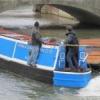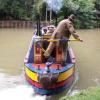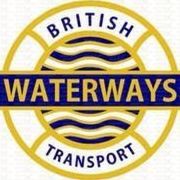Leaderboard
Popular Content
Showing content with the highest reputation on 03/08/13 in all areas
-
Tell you what, I've never empathised more with Phylis as a user of a different type of boat that's in a minority. I think it's incredibly misguided to make broad brush accusatory statements like some have done here. Apparently, the moment I sit down in a rowing boat, I lose all my knowledge of how to navigate, sound signals, and become 'an idiot' as multiple posters have suggested. These generalisations are as false as stating that all powered craft owners go out of their way to disrupt rowing races deliberately, because one boat did so once. I don't deny that there are some people who behave in a manner that brings the sport into disrepute. The biggest problem as a rower is other rowers doing stupid things- stopping dead in front of me, cutting me up, or being in the wrong place. If a rowing boat hits a rowing boat, neither will fare very well, whereas if a rower hits or is hit by a powered craft, the powered craft is likely to escape serious damage, and the occupants are far less likely to be hurt. It's pretty obvious who should be careful and on the lookout for their own safety! A lot of this stems from a completely different attitude towards being on the water. In my narrowboat, I can enjoy the scenery and surroundings. If rowing, I'm focussed on how to get from A to B as quickly and efficiently as possible. Even if not racing, when paddling along the aim is to improve technique and fitness so as to be able to race faster. It's a completely different mindset to boating in a powered craft, and this will affect how I feel about what's going on on the river. If a particular set of exercises is disrupted, or I have to stop just when a certain improvement in technique has started to take an effect, that will be very frustrating and annoying. Some rowers are able to deal with this well, but others in a small minority may well deal with it badly and take it out on someone who is really blameless. I am genuinely sorry and upset that a few people have coloured the experiences of so many forum users- but don't tar everyone with the same brush.2 points
-
I think you may be getting confused, Ange...... What I think you are talking about here is usually known as Boaters' Banter!2 points
-
This post cannot be displayed because it is in a forum which requires at least 10 posts to view.
-
I would like to find a mooring somewhere between Uxbridge and Rickmansworth, can anyone tell me if this is possible and if so how might I go about it?1 point
-
Hi ally, I am also looking for a boat and having listened to all the "chuffin" engines that go through Foxton locks my "must have" changes on an almost daily basis. I'm in love at the minute with a Lister--god knows which one but I sat in an engine room whilst a boat owner explained all. Its a maze out there but I will find my boat, I thought of doing some sort of course to learn about engines as my poor ole dad R.I.P. in April--he was a Massey man but tractors not boats so not sure what he would say. I am hoping boats easier to control than tractors!1 point
-
Don't think a cruiser stern will make a difference as to whether you are alone in the rain!1 point
-
So, an excellent opportunity to volunteer to help them out Laurence? Richard1 point
-
Ah yes, the Home Secretary who sent armed troops to Tonypandy to put down a strike in 1910.1 point
-
"During my time in industry, we had a new engineering manager fresh out of university with so many theoretical thoughts about how best to maintain the factory. He would muse over multiple calculations all day long then put them into practice. We, in turn, would untangle his complicated ideas at great cost and replace them with common sense alternatives. The storage areas were full of his expensive failures." He probably was trying to fix things that weren't broken. Whenever we had an improvement request or a project I insisted that my engineers throw theory at it before they attempted to modify.this saved a lot of tears. Going back to the thread: It's a discussion on heat storage which is interesting, radiators aren't heat storage devices, quite the opposite. The OP wants to store excess heat for slow release during the night. His idea is good and the posts show an interest in the subject. I was looking at forcing the air convection down the length of the narrow boat and use the linings etc as the heat source ( hold a tissue to the saloon vent when you have a fire lit, you will see how much hot air goes outside, then do this down the length of the boat - the air has to start circulating.but remove the tissues after experimenting).1 point
-
Oh dear, there seems to be a lot of the old macho stuff happening on this thread with "My boat weighs 20 tons" and "My boat weighs 36 tons" etc etc. Something people are losing sight of is the fact that Phylis is on this forum because she loves boating, exactly as I did when I joined and had a GRP cruiser. However having come over to the dark side I have to say that on balance my 60 footer is easier to handle than my 40 ft GRP cruiser. It has to be remembered that all boats have different handling characteristics depending on the material of their construction, hull form etc etc and all boats have their own idiosyncrasys so I feel it is wrong to have a pop at someone whose boat does not fit your norm. Remember we all love boating. Phil1 point
-
This post cannot be displayed because it is in a forum which requires at least 10 posts to view.
-
As it happens our pair will be going on to the Thames from Brentford tomorrow. An ideal opportunity for someone to join us, take the tiller and demonstrate just how manouverable they are, show use this rapid ferry gliding, dodging around skiffs etc. etc. They are carrying 36 tons so probably weigh around 60 - I'm sure experience of handling a light glass fibre cruiser will be all you need.1 point
-
i find that if you aim straight at them they're out of the way by the time you get there.1 point
-
Indeed. Plus throw in a handful of first time hirers in large cruisers for good measure!1 point
-
Everybody does this slightly differently, and it depends whether the pair is 2 or 3 handed. If I was 2 handed I would have the motor steerer closing the top gates whilst the lock wheeler opens the bottom paddles and sets one of the 'gate lines' before cycling down to the next lock. The motor steerer has plenty of time to set the other 'gate line' before getting back on board, holding back and opening the bottom gates. This only really works when empty as the boats can often be kept abreast for quite long distances, well on the Grand Union Canal south of Leighton Buzzard anyway. If I was 3 handed I would have the steerer closing the top gate on his side before walking down and opening the bottom paddle on his side then setting the 'gate line' before getting back on board. The butty steerer would close the top gate on their side then set the 'holding back line' and make any minor adjustments to the engine speed / gears. Meanwhile the lock wheeler would draw the bottom padldle on their side and set one of the 'gate lines' before cycling down to the next lock. I would then travel singled out as it is faster than running abreast for long distances. When boating nowadays we are expected to close gates and paddles behind us. This is fairly easy if empty and running abreast as the boats can be stopped in the bottom lock mouth with the butty steerer closing one side and the motor steerer popping up and closing his side. This is even possible when 2 handed where the motor steerer closes both sides whilst the other crew member cycles on as lock wheeler. With a little practice this is quite slick and not that much effort. I have always tried to let the boats and the water do as much work as possible whilst the crew just do what is left over. I have boated part loaded and empty pairs on the Grand Union Canal single handed on numerous occasions and still covered good distances each day. Single handed boating with pairs on narrow canals is a different proposition, but still not particularly hard work if you do it well.1 point
-
Chris Pink and Dave Mayall discuss it here until they agree with each other...1 point
-
John, I wouldn't dispute that strict enforcement of VM time limits can lead to apparently ludicrous situations, and neither would I dispute that there may be ways of improving that. However, let me play devil's advocate for a moment (I know, not what I normally do). Let us consider a hypothetical 48 hour visitor mooring that can accomodate 10 boats. The canal is not too busy, and on average, every day two leisure boats arrive to stay just for one night moving on in the morning, and two boaters on an extended cruise (maybe CCers, maybe not) arrive and stay for the maximum time that they are allowed (2 nights). On any given night, there will be 6 boats moored (two staying for the night, two on the first night of a 2 night stay and two on the second night). The mooring is never actually "full", and there is always room for somebody else to moor. Because the mooring is not full, somebody arrives and decides that they will stay longer (say 4 nights), and as a result, the occupancy of the moorings actually climbs to 8 boats at one point, but the mooring is STILL never full. You may ask the question "what is the problem?" Nobody was prevented from mooring. To my mind, the problem is that the only reason that the mooring didn't fill up is that all the other boaters stuck to the 48 hour limit. Had they decided that if you were going to do it, so were they, the mooring WOULD have filled to capacity. So, the ability for some people to push beyond what is allowed relies upon everybody else NOT taking the same attitude. If a mooring is never full, CRT should change the limits (in our hypothetical example they might increase to 3 days), so as to set a level playing field as to what is allowed, rather than some people obeying the rules and others taking advantage. I wouldn't object to a formalisation of the "stay on if not busy" concept, creating moorings that were 48 hour by default, with mooring wardens able to give permission for an extended stay if asked, rather than a free for all where those who choose to flout the rules are better off. Equally, I see no issue with flexible limits based on time of year. (48 hours Easter to October, 5 days otherwise)1 point
-
1 point
This leaderboard is set to London/GMT+01:00














